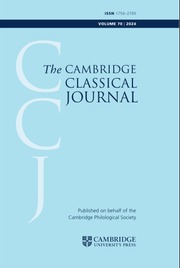No CrossRef data available.
Article contents
HOMERIC MOTIVATION AND MODERN NARRATOLOGY: THE CASE OF PENELOPE
Published online by Cambridge University Press: 25 January 2018
Abstract
Forged mostly in readings of the modern novel, the tools of narratology have allowed us to detect many features that ancient literature shares with modern texts. At the same time, they have detracted from crucial differences between ancient and modern narratives. This article argues that, while being at the origin of the classical western plot, the Odyssey also features a narrative logic that differs significantly from what the modern novel has taught us to expect. It focuses on the case of Penelope. Various theories have been advanced to explain Penelope's intervention in books 18 and 19. The difficulties that modern scholars have had with Penelope, it is suggested, are due to a special kind of motivation which is also prominent in medieval narrative.
- Type
- Research Article
- Information
- Copyright
- Copyright © The Author(s) 2018. Published by Cambridge University Press
Footnotes
This article is part of the work of the ERC group ‘Experience and Teleology in Ancient Narrative’ (AncNar, n. 312321) – I wish to thank the members of this group, Annika Domainko, Luuk Huitink, Jakob Lenz and Aldo Tagliabue, for many stimulating discussions. I have also greatly benefited from the comments of Eva von Contzen, Athanassios Vergados, the audience of the Cambridge Philological Society and CCJ’s two anonymous readers.


